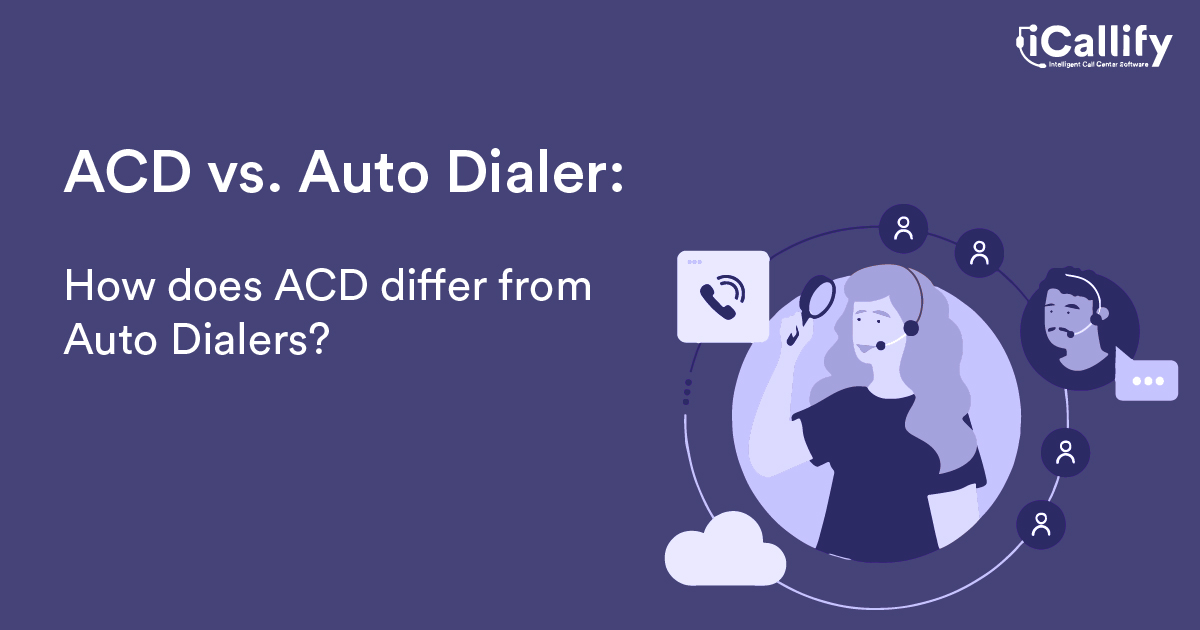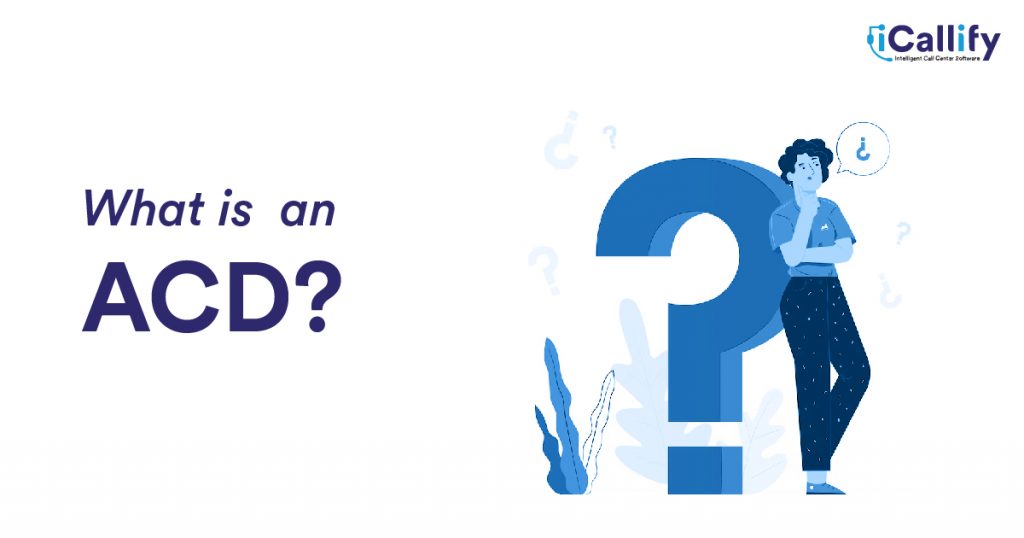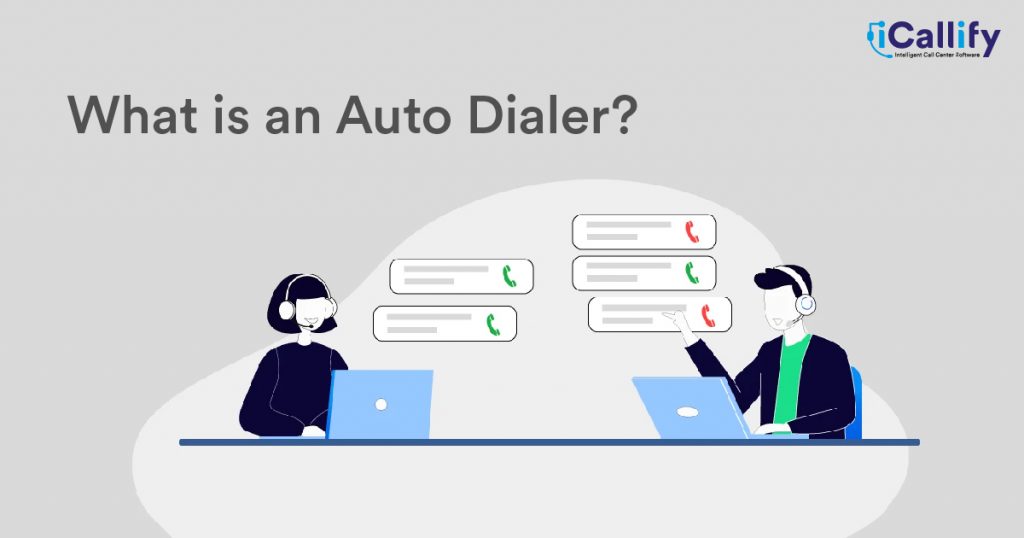
ACD vs. Auto Dialer Automation in different business jobs helps in improving efficiency and accuracy. Moreover, it helps in achieving several amazing business benefits. This has been one of the major driving factors behind the massive demand for automated solutions. In this blog post, we are going to discuss two commonly used and popular automated systems: automatic call distribution software and auto dialer software.
Both of these solutions are completely different, and they have their own pros for businesses. In general scenarios, businesses can use both of these automation systems to augment their results and returns. Depending on the business model and use cases, a company can select any of these automation solutions. To help you make the right choice, we will give detailed insight into both of these systems, plus, we will also make a comparison of these solutions, so you can acquire the right platform and enjoy a multitude of advantages.
What Is ACD?

As time progressed, the number of skilled agents in each department increased and this increased the need for an automated system that connects the callers to the right agent that can be quickly available to attend the call, as well as give satisfactory resolution to the caller. An ACD is a feature available in the automated call distribution software, which automatically puts a caller in the queue of the group of agents or an individual agent, depending on the selected algorithm, so the caller can be handled quickly, efficiently, and effectively. Moreover, the caller can receive a satisfactory response and resolution.
What Is an Auto Dialer?
Auto dialer is an auto dialing system, which picks up the phone number from the database or a list of contacts and automatically dials it. It can dial a single number or even multiple numbers depending on the selected auto dialing feature. An automated dialer software solution can have multiple auto dialers to provide more efficient operations. Depending on the nature of the business campaign, the automated dialer feature can be used to achieve maximum reach, connect rate, and goal conversion.
ACD vs. Auto Dialers: How Does ACD Differ From Auto Dialers?
Fundamental Role
The Fundamental role of an automatic call distribution software solution is to distribute incoming calls effectively and achieve better customer satisfaction. It is used in a business that handles more incoming calls on a regular basis.
The fundamental role of an auto dialer system is to dial numbers effectively. Depending on the selected feature, different goals can be achieved such as increased reach rate, increased productivity, reduced agent idle time, reduced call abandonment rate, and more. It is used to enhance the results of outbound campaigns.
Transform Your Customer Experience with ACD or Auto Dialer Solutions
Major Types
Automatic Call Distribution Solution is available in different types and depending on the use case or nature of the campaign, a business can use the right ACD. The software provider companies also provide custom ACD rules. The majorly available 5 ACD rules are briefly explained hereunder:
Random
ACD, or Automatic Call Distributor, plays a crucial role in efficiently managing incoming calls. It routes incoming calls to the most suitable available agent based on various factors, ensuring that customers receive prompt assistance. ACD enhances customer service and minimizes call wait times.
Round Robin
ACD and Auto Dialers differ in how they handle call distribution. In the case of ACD, calls are distributed sequentially using a Round Robin approach. The first agent who logs in or is listed receives the first call, followed by the second agent, and so fort. On the other hand, Auto Dialers initiate calls automatically without a set order or sequence.
Most Idle Agent
The “Most Idle Agent” refers to the agent within the ACD system who has been idle, or not actively engaged in a call or other tasks, for the longest duration. When an incoming call arrives, the ACD software identifies and directs the call to the agent with the highest idle time. This approach is used to ensure fair distribution of incoming calls among agents, optimize workload, and prevent overburdening of any particular agent. It aims to maintain efficiency and equitable call handling.
Also Read: Automatic Call Distribution Software Solution & Its Importance
Sticky Agent
A “Sticky Agent” in ACD software routes returning callers to the same agent they’ve interacted with before. This approach aims to provide a consistent and personalized customer experience. The ACD system remembers the caller’s previous interaction and ensures it connects them to the same agent when they contact the organization for a subsequent inquiry or follow-up. This is done to enhance customer satisfaction by allowing the caller to continue their conversation with someone familiar with their history and needs.
Skill Based Distribution
The agent that holds the most skills to resolve the concern or question of the caller receives the call.
In auto dialer software, you will find different types of dialers that automatically dial calls and you can choose the best dialer depending on your business campaign goals. The majorly used 3 auto dialers are briefly explained hereunder:
Progressive Dialer
It is also referred to as a sequential dialer because it picks up numbers in a sequential aka progressive manner one by one from the list and dials them automatically.
Preview Dialer
This dialer provides agents with a brief customer or lead preview before dialing a number, enabling them to prepare for the call. Moreover, the agent will also have the option to either dial or skip that call.
Predictive Dialer
This is the most advanced dialer available in the auto dialer software. It predicts when the agent will be available and dials multiple numbers before that.
Use Cases
You can use an automated call distribution software solution primarily to manage incoming calls. The incoming calls can be calls related to:
- Customer concerns
- Request for technical support
- Request for guided purchase
- Warm lead
- And more
Businesses Use Automated Dialer Software To Execute Outbound Campaigns Like:
- Lead generation
- Lead nurturing
- Cold calling
- Collection
- And more
Concluding Notes
An ACD and auto dialing system has their own roles in a business. The business needs to answer calls from existing customers and provide them with the required information and support regarding products they have already purchased. They also need to use ACD to attend warm leads. On the other hand, auto dialers are amazing in reaching out to leads and clients and managing outbound campaigns more productively to boost outcomes.
We offer the best ACD and auto dialing solutions with all powerful features embedded in them. If you are in quest of a solution that can manage your inbound and/or outbound campaigns effectively, we can help you with our best in the industry solutions. To explore more about our automatic call distribution software and auto dialer software, get in touch with us TODAY!



Leave a comment